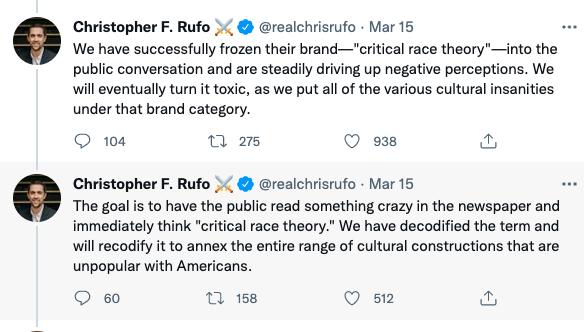What’s With the Acronym Salad Being Used to Attack Public Schools?
Pro-privatization groups and politicians are fighting harder than ever for state-level and universal “school choice” that redirects public dollars to private schools through vouchers and for-profit charters. From Ohio and Oklahoma and Arizona to Michigan, schools and educators are the focus of manufactured attacks that “blame” them for inspiring these programs. This movement has been active for several decades and is rooted in questionable intentions, but it has always struggled to take widespread hold.
Sensing a new opportunity due to societal division, politicians and think tanks like The Heritage Foundation, ALEC, and Manhattan Institute reignited these attacks that completely spin, exaggerate and make-up issues to weaponize schools and teachers to further their cause. Their “low hanging fruit” is anything with an acronym, like “CRT,” DE&I” and “SEL” or “LGBTQ,” knowing they are less understood and easy to manipulate to drive fear about the unknown. We know this to be true because those waging these attacks have laid out their plans for public consumption in hopes they gain credit for turning America’s tide toward privatization in education once and for all.
Is it any coincidence Michigan is facing a new voucher program that could take BILLIONS from our public schools at the same time these attacks have picked up? Or that a gubernatorial candidate backed by politicians and groups is promoting anti-public school vouchers and corresponding rhetoric?
If we love our neighborhood schools, we must support pro-public education candidates who are aware of these REAL issues - and that includes candidates for Forest Hills Public Schools Board of Education.
We want Board candidates who rally community support for public education over serving as a megaphone for manufactured privatization arguments from a paid think tank leader or cable news hosts.
It’s extremely alarming that candidates for the Board of Education for a top-ranked district would play into this false narrative and not take steps to research sources or demonstrate an understanding of the “war on public education” with the goal of privatization in mind. NPR and Ipsos report 76% of parents are pleased with their schools – a year into these manufactured attacks. Our schools are not failing our kids, as claimed.
Let’s look at the acronym salad being tossed about and why it’s problematic as a campaign platform – and downright disinformation.
CRT
Critical Race Theory is a catchall term Manhattan Institute leader Christopher Rufo lifted from college-level legal courses. We all know it is not taught in K-12 schools.
Read: The Aristocrats Funding the Critical Race Theory Backlash
DE&I
Diversity, Equity and Inclusion is usually rolled up under the CRT acronym by public school critics. This acronym is focused on promoting acceptance (not shame or blame!) and ensuring supports are in place to help students and employees feel welcome and represented. Research has shown that academic outcomes, such as motivation, dropout rates and academic performance, were correlated with feelings of belonging. A study demonstrated that college students' self-reported level of school belonging in high school positively corresponded with academic achievement in college.
Equity and inclusion are not solely about race, though it is helpful to ensure books and content reflect as many students’ lived experiences as possible. Equity and inclusion can apply to things like helping students who have learning disabilities feel welcome. For example, offering learning opportunities between students in a traditional classroom and special education together. Or ensuring students have the proper tools and staff to navigate neurological or physical differences – such as adaptive gym equipment, busses, or desks.
SEL or CASEL
Social Emotional Learning is all about the “soft skills” or emotional intelligence that’s known for increasing success in college or careers. SEL helps kids build resilience, increase self-awareness, manage emotions, or build relationships. It is not a new practice but it’s being politicized to the potential detriment to student mental health and safety.
Read: Parents protesting Critical Race Theory identify another target: Mental health programs
LGBTQ
The war on LGBTQ individuals has skyrocketed over the past year and suicide rates are at a three year high. This is the latest manipulated term by Rufo and others who promise to roll this phrase up under the idea that schools are promoting “gender ideology.” In fact, this term is so manufactured that if you Google it, all you will find are think tanks and their websites calling it out as “bad.”
LGBTQ is a protected class of citizens. We must clearly distinguish the difference between allowing students and educators to be included and public schools supposedly “pushing gender ideologies” or worse, calling teachers “groomers.”
This week, The Trevor Project published its National Survey on LGBTQ Youth Mental Health and found:
45% of LGBTQ youth seriously considered attempting suicide in the past year.
73% of LGBTQ youth reported experiencing symptoms of anxiety
LGBTQ youth who found their school to be LGBTQ-affirming reported lower rates of attempting suicide
We find it problematic that there are efforts to ban any and all LGBTQ books through age 18. Not only does this not create an inclusive environment, but it also goes against the First Amendment. Local parents recently tried to get rid of an anti-bullying book where a character was taunted and excluded over having same-sex parents. Where do we draw the line on censorship?
Watch for this buzzword salad from candidates and think about what it puts on the line. At the end of the day, Forest Hills Public Schools is focused on academic excellence, not “indoctrination.” Last year, more students graduated from the district high schools than in the past 15 years. Clogging up Board meetings with these manufactured issues takes up time and space that could be dedicated to locally relevant topics, discussing data, identifying ways to further elevate the district’s excellence, and confirm it is set up to withstand the financial implications of a voucher program.







